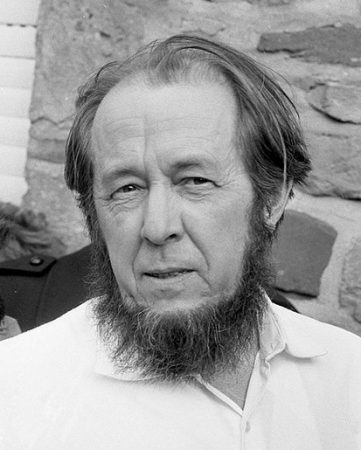By Michael Miley
LYNDON, Vt. — The international conference “Reading Solzhenitsyn,” dedicated to the 100th anniversary of Aleksandr Solzhenitsyn’s birth, concluded with fanfare and applause from dozens of participants, who came from such far away places as Russia and the People’s Republic of China to celebrate the Nobel Prize-winning author.
While in exile from the Soviet Union, Solzhenitsyn spent the majority of his years in Cavendish, Vermont, where he wrote several works including “The Red Wheel,” a seminal three-part narrative of the Russian Revolution. The author later claimed that his years in Vermont were among the most productive of his life.

Russian author and historian Aleksandr Solzhenitsyn
Earlier this month at the Alexander Twilight Theatre on NVU’s Lyndon campus, professors from Vermont and beyond held numerous symposiums on the life and works of the Russian novelist and historian.
Dr. Alexandre Strokanov, professor of history and chair of the Institue of Russian Language, History, and Culture at Northern Vermont University, organized the two-day event, which ran from Sept. 7-9.
“There were a lot of smaller sessions and two roundtable discussions attended by all the participants,” Strokanov told True North.
While participants came from many different backgrounds — linguists, historians, literary scholars, political scientists, psychologists and medical doctors were in attendance — all their endeavors had brought them in one way or another to Solzhenitsyn and his works.
One of the many topics discussed at the conference was Solzhenitsyn’s “prophetic role” in envisioning the future not only of Russia, but also the United States and the broader global order. Solzhenitsyn was a prolific writer, and his writings touched on a variety of subjects from politics to economic issues.
Strokanov said the event was important in part because academics have in fostering dialogue between the United States and Russia.
“I tell Americans very often why Solzhenitsyn is still important, because it is very difficult for people to understand post-Soviet Russia — today’s Russia — without having read his works, such as ‘Russia in Collapse’ and ‘How to Equip Russia,'” he said.
“To understand Russia and what is happening in Russia today,” Strokanov added, “read Solzhenitsyn, because much of what he wrote today is being put into practice.”
Participants of the conference included professors from the Russian State Humanitarian University in Moscow, including Igor Kondakov. Also participating were Natalya Kovtun, a professor from Krasnoyarsk State Pedagogical University, and Vladislav Krasnov, president of the Russian-American Goodwill Association.
The conference also was attended by the leading American researcher on Solzhenitsyn, professor Richard Tempist of the University of Illinois Urbana-Champaign, and University of Vermont professor Kevin McKenna. The conference also hosted two professors from the People’s Republic of China: Wang Jiaxing of Nanjing University, who studies the fictional works of Solzhenitsyn, and Li Xinmei of Fudan University, who has translated Solzhenitsyn’s works into Chinese.
Solzhenitsyn’s reach goes far beyond the strictly political. One conference attendee, Dr. Susan Miller, an oncologist specializing in bio-ethics, gave a presentation explaining why she believes Solzhenitsyn is the “father” of this varied field of medicine and biology. Solzhenitsyn’s book “Cancer Ward,” which was based on his own experience fighting the disease, is considered by Strokanov to be one of his most long-lasting works. “Time erases interest in many issues, but interest in this book will not be erased, it is timeless,” he said.
The conference also dedicated a special reading room in the Northern Vermont University Library where photographs and books of Solzhenitsyn have been collected and displayed. Strokanov suggested that special exhibitions concerning the author and his life in Vermont may be held there in the future.
The conference was heralded by top Vermont politicians, including Sen. Patrick Leahy, who met Solzhenitsyn in 1990, and Gov. Phil Scott. Both sent well-wishes to the conference attendees.
Strokanov says he is playing the idea of hosting another conference again in the future.
“Maybe it should become a tradition,” he said. “The spirit of Solzhenitsyn will always be in Vermont, and it is important that we continue to celebrate it.”
Michael Miley is a guest writer and columnist for True North Reports. He lives in West Burke, Vermont.



Solzhenitsyn should be required reading & studying for all Vermont Public Schools, Colleges & Universities. Thank God people like Solzhenitsyn find the ability to escape the oppression, suppression & silencing by the leftist clutches of Socialism & Communism to tell the World the truth. Solzhenitsyn should be honored for all his works including his contribution to Vermont while he lived here before finally being able to return home to Russia in the early 90s after the dissolution of the murderous Socialist/ Communist USSR.
why the censorship?